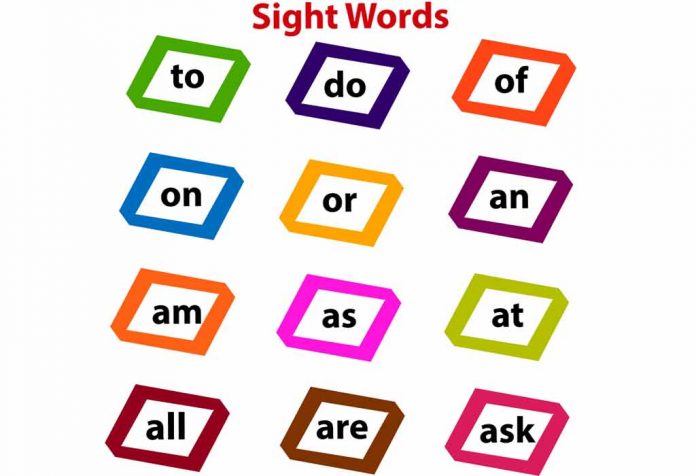- What Are Sight Words?
- Characteristics of Sight Words
- What Are The Types Of Sight Words?
- Benefits Of Learning Sight Words For Kids
- At What Age Should Your Child Start Learning Sight Words?
- How Many Sight Words Can You Teach To Your Child?
- List Of Sight Words For Children
- Examples Of Sentences With Sight Words For Kids
- Teaching Sight Words To Your Child
Sight words will improve your child’s language skills and comprehension. They will enable your child to communicate with others efficiently. But how should your child go about it? First of all, your child should be familiar with the definition of the sight words to quickly recognise and comprehend them, and second, they should use them appropriately while communicating with others. Some examples of sight words your child can start with are – please, never, look, around, eat, and others. Read on to get more information about sight words.
What Are Sight Words?
These are the words that appear more frequently than others in reading and writing materials. Sight words occur so often that the kids are expected to recognise them quickly and easily. Sight words in English are not easily represented by graphics or images. They are not often linked to some particular subject. That is why kids find them repeatedly in various books, irrespective of the topic. Teaching these sight words to kids will enable them to become proficient readers.
Thank you for reading this post, don't forget to subscribe!
Characteristics of Sight Words
Some of the crucial characteristics of sight words are:
- Sight words often appear in text or speeches and are therefore considered high-frequency words.
- Most of these words, when used in a sentence, provide a sense to the text as a whole.
- They are mostly pronouns, prepositions, verbs, adverbs, conjunctions, and adjectives.
- Sight words cannot be easily represented through images or videos. It is impossible to explain sight words like ‘the’ or ‘it’ through pictures!
- These words are quite random. Some sight words cannot be found very consistent in terms of pronunciation.
- Teach your kids basic sight words that can only be memorised and recognised.
- Sight words provide meaning to the information you want to share, thus making communication easy.
- Sight words help to increase the fluency of the language when used appropriately.
- These words might be small but have more weightage in terms of meaning.
What Are The Types Of Sight Words?
Sight words are divided into the following categories:
1. Frequently Used Words
Some words in English frequently appear in the text, and we call them frequently used sight words. For example, can, it, and, will, etc. Help your child memorise these words so they can read and write simple sentences.
2. Non-Phonetic Words
These sight words cannot be decoded using standard syllable patterns and alphabetic principles, for example, sight words like talk, buy, and come. Hence, they are called non-phonetic words. Memorising these words with pronunciations and spellings will help kids recognise similar words, such as walk, guy, or some.
3. Dolch Sight Words
Edward William Dolch compiled the Dolch word list in 1936. It is a list of frequently used English words (also known as sight words). He was a strong supporter of the ‘whole-word’ approach to teaching simple reading.
4. Fry Sight Words
The list of Fry Sight Words includes more modern words and captures commonly used 1,000 words. Dr Edward Fry developed an expanded Fry Sight Words list in the 1950s, based on the common words that generally appear in reading materials used in classes 3-9, for example, ever, since, dog, room, etc.
5. Top 150 Written Words
These words are the newest addition to the list and are commonly used by those learning English as a non-native language. Some examples of these sight words are – a, about, after, again, etc.
Benefits Of Learning Sight Words For Kids
Some of the benefits of sight words for kids are :
- Builds Vocabulary: As a parent, you must teach your child sight words to develop a rich vocabulary. Sight words for kids are the first set of words that kids would come across while reading a book and, therefore, should become a part of their vocabulary.
- Improves Reading: Sight words are important to improve kids’ reading fluency. They help build vocabulary and aid overall comprehension and communication in kids.
- Familiarises With Pronunciation: When kids come across sight words so frequently, they get familiarised with the way they should be pronounced.
- Refines Kids’ Writing Skills: Sight words help kids improve reading skills and, therefore, automatically have a great effect on their writing skills. If kids are familiar with sight words, they will be able to write better.
- Introduces Them To English Phonetics: Sight words have irregular phonetics, and kids should be aware of sight words, their pronunciation, and spellings.
At What Age Should Your Child Start Learning Sight Words?
There is no particular age to start learning sight words. You should teach your child sight words when they are able to recognise and name all the lower-case letters of the English alphabet.
How Many Sight Words Can You Teach To Your Child?
There is a huge list of sight words in the English language. Generally, if your children study in kindergarten, teach them around 50 sight words to begin.
List Of Sight Words For Children
| About | Are | Had | May | That |
| Sit | I | Out | There | On |
| Thank | Was | Around | Come | You |
| From | Our | Know | When | She |
| What | Them | Much | They | Say |
| And | Have | Big | To | Then |
| A | Down | By | In | Could |
| The | Never | Please | We | Best |
| An | Give | How | Her | Very |
| Like | Nice | Did | Of | Pretty |
| Has | Help | Not | So | He |
| Up | Any | Am | Can | With |
| Always | No | My | Be | Also |
| Said | Where | Him | Us | But |
| Date | Do | If | Many | Why |
| Their | It | Look | Here | His |
| Some | Is | Does | Than | Eat |
| Yes | Me | Been | Go | Who |
Examples Of Sentences With Sight Words For Kids
Here are some examples of simple sentences with sight-word:
- This is my new school bag.
- I am going to the mountains.
- This is my friend, Smita.
- I have an aquarium.
- Do you have a notebook?
- I have seen a large bird.
- I went on a picnic on a bus.
- Priti is playing with dolls.
- I saw a tiger in the zoo.
- I like to eat custard.
- Is this your new piano?
- There are many flowers in the garden.
- Do you like to read books?
- Do you want to play kabaddi or hide and seek?
- In which class do you study?
- Do you like playing with your puppy?
- Can your best friend come to your birthday party?
- I brought apples in my tiffin.
- I will go to the beach this summer.
- Rahul is the topper of his class.
- I have never played video games.
- My favourite fruit is watermelon.
- Why don’t you carry an umbrella in your school?
- His mother suddenly fell sick.
- My class teacher asked me to say my name.
Teaching Sight Words To Your Child
First, you must understand what sight words are for kindergarten and then follow the tips given below for teaching them to your child.
1. Introduce Your Child To Sight Words Through Charts
Charts are a good way to teach sight words to kids. Hang chars with sight words in their room, where they can see them more frequently. It will help them retain the words for an extended period.
2. Read The Sight Words Aloud For A More Interactive Session
When you read books with your child, there will be repetitive phrases containing sight words like at, am, and, I, a, it, in, is, and the. Encourage your child to read sight words along with you.
3. Simple Exercises
Give multiple exercises to your child to attempt. For example, give them simple sentences and ask them to mark or circle the sight words.
4. Activities And Games
Involve kids in various learning games to help them learn sight words. Here’s what you can do – write one sight word on each sticky note and paste the notes on the wall. Say any sight word aloud, and your child will need to spot the note containing that sight word. Pat your child’s back when they spot the correct note. Do this for the rest of the sight words. Isn’t it a cool way of teaching sight words?
Knowledge of sight words helps children become fluent in the language. You can use the above techniques to teach your child sight words in a fun and easy way.
Also Read:
Descriptive Words for Children to Learn
Rhyming Words for Children to Develop Strong Verbal Skills
Compound Words for Kids with Types and Examples











